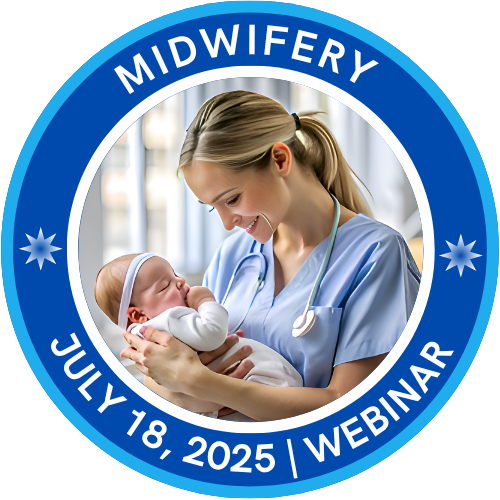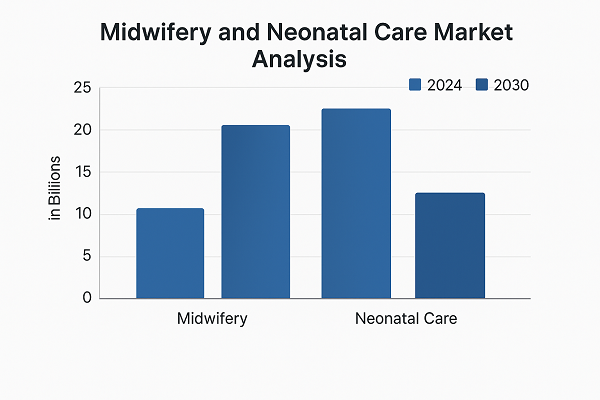Welcome to the 2nd Webinar on Midwifery and Neonatal Care, taking place on July 18, 2025 - a global gathering where compassion meets innovation, and every journey begins with care. We're honored to bring together midwives, neonatal care professionals, and maternal health advocates to share knowledge, celebrate progress, and ignite transformative conversations. This webinar is more than just a session; it's a united movement to uplift care practices, foster impactful collaborations, and improve outcomes for mothers, newborns, and communities worldwide. Together, let's honor tradition, embrace innovation, and build a healthier, more empowered future.

Join us for the 2nd Webinar on Midwifery and Neonatal Care on July 18, 2025, focusing on the critical importance of maternal and new-born health. This event will bring together midwives, healthcare professionals, and researchers to explore the latest advancements in midwifery and neonatal care practices, as well as strategies to improve maternal and infant well-being. Attendees will gain valuable insights into modern treatment approaches, best practices for safe deliveries, and the vital connection between maternal health and infant outcomes. The webinar will also feature live Q&A sessions, expert panel discussions, and interactive presentations, providing participants with up-to-date knowledge and practical guidance. Whether you're a healthcare professional, student, or expectant parent, this webinar offers essential information to support maternal and new-born health.
Midwifery combines clinical expertise with compassionate, woman-centered care. It emphasizes minimal intervention, informed choice, and continuity of care. Midwives are trained to detect complications, provide emergency care, and refer to obstetricians when necessary.
Neonatal care encompasses a range of services starting immediately after birth, including resuscitation, thermoregulation, breastfeeding support, infection prevention, and advanced interventions in Neonatal Intensive Care Units (NICUs) for high-risk newborns. It is provided by a multidisciplinary team including neonatologists, nurses, lactation consultants, and other specialists.
This session explores the transformative innovations in midwifery practice and education that are shaping the future of maternal and neonatal health. As global healthcare systems evolve, midwives are increasingly adopting evidence-based approaches, digital tools, and collaborative models to improve outcomes for mothers and newborns. The session will highlight the integration of technology in training, the shift toward patient-centered care, and strategies to address disparities in access and quality. It aims to foster dialogue among educators, practitioners, and policymakers to promote sustainable, culturally competent, and effective midwifery practices.
Midwives play a pivotal role not only in physical maternal and neonatal care but also in promoting and safeguarding maternal mental health. They are often the first healthcare professionals to identify signs of emotional distress, anxiety, and depression during the perinatal period. By fostering trust, offering emotional support, and facilitating access to mental health resources, midwives contribute significantly to holistic maternal well-being. Their role extends beyond childbirth to include prenatal education, postpartum follow-up, and advocacy for mental health awareness and policy implementation in maternal care systems.
This topic explores the integration of evidence-based practices in the management of labour and delivery, emphasizing the roles of midwives and neonatal care providers in improving maternal and neonatal outcomes. It focuses on clinical guidelines, patient-centered care, safety protocols, and the latest research shaping intrapartum care. The session will highlight how standardized, research-backed interventions enhance care quality, reduce complications, and support physiological birth processes.
Culturally competent midwifery care refers to the ability of midwives to provide care that is respectful of and responsive to the cultural and linguistic needs of diverse populations. It involves recognizing and valuing cultural differences in beliefs, practices, and values surrounding pregnancy, childbirth, and newborn care. This approach improves health outcomes, enhances patient satisfaction, and supports equity in maternal and neonatal care.
This topic explores the key differences in the safety, outcomes, and experiences of home births versus hospital births, with a specific focus on the roles of midwifery and neonatal care.
After childbirth, mothers undergo significant physical, emotional, and hormonal changes, while also adjusting to the demands of caring for a newborn. Postpartum support involves helping mothers recover from childbirth, address physical discomforts, and foster a supportive environment for their mental and emotional health.
Lactation counseling is a vital aspect of postpartum care. It supports mothers in establishing and maintaining breastfeeding, guiding them through challenges such as latch issues, milk supply concerns, and general breastfeeding techniques. The goal is to ensure that the mother and baby are both nourished, supported, and healthy during this time.
Midwives utilizing these approaches integrate various therapeutic modalities, such as nutrition, herbal remedies, acupuncture, and mind-body techniques, with conventional medical practices. This results in personalized care that empowers women, enhances birth outcomes, and supports families in making informed, individualized decisions regarding pregnancy and childbirth.
The Neonatal Intensive Care Unit (NICU) is a specialized medical facility designed to provide care for newborns who are critically ill or premature. Over the years, significant advancements in technology, treatment methods, and clinical practices have significantly improved neonatal care, leading to higher survival rates and better long-term outcomes for infants. These advancements are intertwined with midwifery practices that focus on providing care during pregnancy, childbirth, and the early stages of life, ensuring the best possible outcomes for both mother and newborn.
Neonatal resuscitation refers to the urgent care provided to newborns who require assistance in initiating or maintaining breathing after birth. It aims to stabilize the newborn's heart rate, oxygenation, and respiratory function, preventing long-term complications or death. Resuscitation protocols are based on evidence-based guidelines and protocols from organizations like the American Heart Association (AHA) and the American Academy of Pediatrics (AAP).
This early delivery can result in a range of challenges for both the newborn and the parents. Premature infants often face a higher risk of health complications due to the incomplete development of vital organs such as the lungs, brain, and digestive system. Addressing premature birth requires specialized care from midwives, neonatal teams, and other healthcare professionals.
Due to their underdeveloped immune systems, neonates are highly susceptible to bacterial, viral, and fungal pathogens. Understanding the immune responses in neonates-including both innate and adaptive immunity-is essential for improving outcomes through timely interventions, maternal immunization strategies, and postnatal care.
Parent-infant bonding is a vital aspect of early development, contributing to long-term emotional, psychological, and physical outcomes. In Neonatal Intensive Care Units (NICUs), this natural bonding process is often disrupted due to medical complexities, separation, and stress. This topic explores how midwives and neonatal care professionals can support and facilitate bonding in high-risk settings. Emphasis is placed on family-centered care, emotional support, and practical strategies to overcome barriers in the NICU environment.
Preterm infants, born before 37 weeks of gestation, often face unique nutritional challenges due to their underdeveloped organs and limited nutrient reserves. Optimal nutrition during the neonatal period is critical for their survival, growth, neurodevelopment, and long-term health. This session explores evidence-based strategies for feeding and nutrient support in preterm infants, emphasizing the roles of midwives and neonatal care teams in ensuring safe and effective nutrition plans. Focus will be placed on early enteral feeding, the use of human milk, fortification practices, and the prevention of feeding-related complications.
Breastfeeding in neonatal care settings presents unique challenges that require specialized knowledge and supportive strategies. Preterm births, low birth weight infants, and maternal health complications can impact breastfeeding initiation and sustainability. Midwives and neonatal care providers play a crucial role in supporting early lactation, ensuring skin-to-skin contact, and promoting exclusive breastfeeding even in critical care environments. Addressing psychological, cultural, and physiological barriers is essential for improving breastfeeding outcomes and neonatal health.
Palliative care in the neonatal setting focuses on providing compassionate, holistic support to newborns with life-limiting or life-threatening conditions and their families. Midwives and neonatal nurses play a key role in delivering palliative care, advocating for family-centered approaches, and ensuring dignity and comfort for the infant and the family throughout the journey.
This topic explores the evolving role of midwives in identifying, managing, and collaborating on high-risk pregnancies. With advancements in maternal healthcare and growing interdisciplinary approaches, midwives are increasingly integrated into teams that support complex pregnancies. The theme also highlights midwives' contributions to early risk detection, antenatal education, timely referrals, and holistic care, while ensuring the well-being of both mother and neonate. Emphasis is placed on collaboration with obstetricians, perinatologists, and neonatal units.
This topic explores the crucial role of midwives in identifying, managing, and preventing obstetric emergencies. It highlights evidence-based practices in antenatal, intrapartum, and postpartum care that significantly reduce maternal and neonatal morbidity and mortality. The session also emphasizes collaborative approaches between midwives and healthcare professionals to enhance maternal and newborn outcomes.
Midwives play a critical role in promoting maternal nutrition and wellness throughout pregnancy, childbirth, and the postpartum period. Their holistic and community-centered approach not only supports physical health but also empowers women through education, emotional support, and practical guidance. By emphasizing nutritional counseling, early risk detection, and culturally appropriate care, midwives contribute significantly to reducing maternal and neonatal morbidity and mortality. Their involvement ensures the long-term health of both mother and child, laying the foundation for a healthy start in life.
Genetic screening and counseling in neonatal care involve the early identification of inherited or congenital disorders through various diagnostic tests shortly after birth. This proactive approach aims to detect conditions that may affect a newborn's long-term health, enabling timely interventions. Midwives and neonatal care professionals play a vital role in educating parents, supporting informed decision-making, and ensuring appropriate referrals for further genetic evaluation and care. Their involvement enhances early diagnosis, promotes parental understanding, and improves outcomes through coordinated care.
Neonatal care providers, including midwives and neonatal nurses, play a pivotal role in its prevention by promoting safe sleep practices, educating families, and ensuring early identification of at-risk infants. This topic explores the multidisciplinary responsibilities of neonatal professionals in SIDS prevention-from delivery room to postnatal follow-up-highlighting best practices, evidence-based interventions, and culturally sensitive education strategies to support safer infant care.
Newborn screening for metabolic disorders is a critical component of early detection and intervention, aiming to identify congenital metabolic conditions that can lead to serious health issues if untreated. Early diagnosis enables timely interventions that prevent developmental delays, organ damage, and even death. This practice involves screening newborns for a range of conditions, many of which can be managed or mitigated through early medical intervention.
The transition from neonatal care to pediatric care represents a crucial phase in a child's development, especially in cases where the infant was born preterm, had complications at birth, or needed intensive care after birth. Neonatal care primarily involves the care of newborns, especially premature or ill infants, and is usually provided in a neonatal intensive care unit (NICU). Pediatric care, on the other hand, focuses on the ongoing health and development of children as they grow.
They are trained professionals who provide continuous physical, emotional, and informational support to the mother before, during, and after childbirth. While they do not perform medical tasks, their presence in midwifery and neonatal care has a significant impact on maternal and infant well-being. Their role is complementary to that of midwives and neonatal care teams, contributing to a holistic approach to childbirth and early parenting.

Our webinars are thoughtfully designed to deliver value to a wide range of individuals. Whether you're looking to grow your skills, explore new opportunities or gain insights from experts, here's who will benefit most from attending:

In a world where knowledge is power, webinars have emerged as one of the most accessible and impactful ways to learn, grow and connect. Don't miss the chance to learn, grow and connect in ways that truly matter.

Registering for a webinar is essential to gain access to the unique opportunities and secure a chance to grow, connect and gain insights that can drive your personal and professional success. Webinars are more than just online meetings, they're gateways to knowledge, innovation, and growth.

The global midwifery and neonatal care markets are experiencing steady growth, with the midwifery market valued at approximately $12-14 billion and neonatal care at $7-9 billion as of 2024, both expected to grow at a CAGR of 7-10% through 2030. Growth is driven by rising birth rates in developing countries, increased awareness of maternal and infant health, and advancements in healthcare technology such as telehealth, AI diagnostics, and wearable monitoring devices. While high-income countries focus on advanced neonatal ICUs and midwife-led birthing centers, low- and middle-income regions present significant growth opportunities due to unmet needs and expanding donor investment. Future trends include telemidwifery, home-based neonatal care kits, and sustainable medical equipment. However, challenges such as workforce shortages, healthcare infrastructure gaps, and disparities in access and regulation persist. Strategic opportunities lie in expanding training programs, developing affordable technologies, and fostering public-private partnerships to ensure equitable and high-quality maternal and neonatal care worldwide.